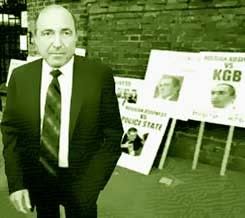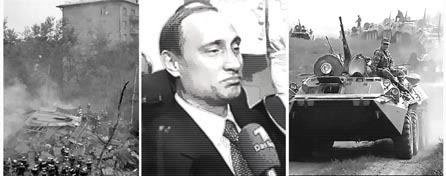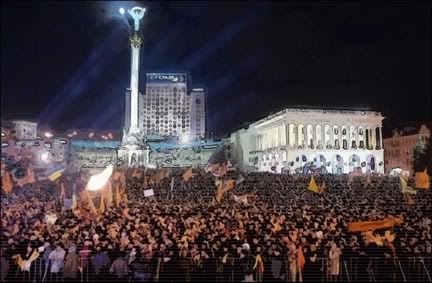Adam Larson
Caustic Logic/Guerillas Without Guns
Posted 4/6/07
Putin’s Kremlin has largely reversed the privatization trend of the 1990s, notably reasserting effective state control over the media sector. District newspapers were reined in early, and the techniques that worked there were then used to bring more politics and less dissent to the pages of national newspapers [1] - like the Moscow Times, which had so recently published rather damning doubts about the Ryazan incident. [2] By 2002 the television networks were being taken over by a new management style, and by the time of an October 2005 piece that was allowed in Nezavisimaya Gazeta, “all programming on Russia's three national television networks was strictly state-controlled: usually determined at weekly meetings between network executives and presidential administration officials.” News broadcasts have become nearly identical regurgitations of the Kremlin line, and to squelch any dangerous spontaneity, “live broadcasts have almost been eliminated.” [3]
The oil and gas sectors went through a similar process. The most dramatic move on this front was the June 2005 government stock purchase in the mammoth gas company Gazprom, giving the state a stake of over 50%, a controlling interest. Thus Putin had effectively re-nationalized a company that supplies about one fourth of Europe's gas needs. This was neither the first move nor the last; the previous year the government seized a portion of the Yukos oil conglomerate over past-due back taxes, and since then has used its growing control over the world’s largest supply of natural gas to exert leverage on its neighbors and on Europe.
Closely related to this trend was the new President’s approach to the Yeltsin-era privatization Oligarchs – at least those that crossed his path as he charged into their turf. One of them, Mikhail Khodorkovsky, in addition to helping drain the treasury, had basically created Yukos, advocated popular liberal policies, and used his vast wealth to finance two liberal parties opposed to Putin. [4] In October 2003 he was arrested on tax and fraud charges, just months ahead of Putin’s buyout of a portion of the company over related issues. Khodorkovsky was convicted and sentenced in May 2005, in the old school tradition, to eight years in a Siberian penal colony. [5]
 |
Animating Moscow’s desire to get their hands on the exiled tycoon is his ongoing agitation for pro-West revolutions in the former SSRs, and his public campaign to link the “abominable autocrat” Putin to the 9/99 apartment bombings that helped bring him to power. Berezovsky first announced this campaign with a March 5, 2002 press conference in London, here he announced: “I am sure the bombings were organised by the FSB. It's not just speculation. It's a clear conclusion.” He clarified “I'm not saying Mr. Putin gave an order to blow up those buildings, but at the least he knew the FSB was involved” as he blamed Chechen rebels and punished them to the tune of a major war. Berezovsky called on a British explosives expert and a former FSB officer to support his claims, which were based mostly on the size and sophistication of the operations. He also cited the Ryazan incident as proof that the FSB was involved in placing wired bags of Hexogen “sugar” in at least one apartment block during the crisis. [10]
The same day as his press conference, an official from Putin’s suddenly ominous government again blamed Chechnya and announced that Berezovsky was not to be trusted. In addition to his long-alleged links to Chechen mafia figures, he was also being investigated for links to rebel leaders and to the murder of a senior Russian police officer in Chechnya. [11] Whatever protests they may lodge against the tycoon, London will not be likely to hand him over any time soon.
Next: Reviving Great Russia/The Switch is Flipped
Sources:
[1], [3] Simonov, Alexei. “Transformations of the Fourth Estate.” Original source: Nezavisimaya Gazeta. October 7, 2005. translation by Tatiana Khramtsova, appeared in Johnson's Russia List on October 10, 2005.
http://www.sras.org/news2.phtml?m=457
[2] Reynolds, Maura. “Ryazan Fears Darker Truth of Bombings.” The Moscow Times. January 18, 2000.
http://eng.terror99.ru/publications/013.htm
[4] Greene, S.A. “Kremlin Targets Jewish Tycoons In War on Critics.”
Forward. October 31 2003. Via NCSJ.
http://www.ncsj.org/AuxPages/103103Forward_Khod.shtml
[5] Country Profile: Russia. BBC News. http://news.bbc.co.uk/1/hi/world/europe/country_profiles/1102275.stm
[6], [8] Simonov, Vladimir. “Bad news for wanted Russian expatriates in London.” Russian News And Information Agency. July 3 2006. Accessed at:
http://en.rian.ru/analysis/20060703/50805984.html
[7] “Boris Berezovsky.” Wikipedia. http://en.wikipedia.org/wiki/Boris_Berezovsky
[9], [10], [11] Steele, Jonathan and Ian Traynor. “Former ally links Putin to Moscow blasts.”
The Guardian. March 6, 2002 http://www.guardian.co.uk/russia/article/0,2763,662476,00.html


